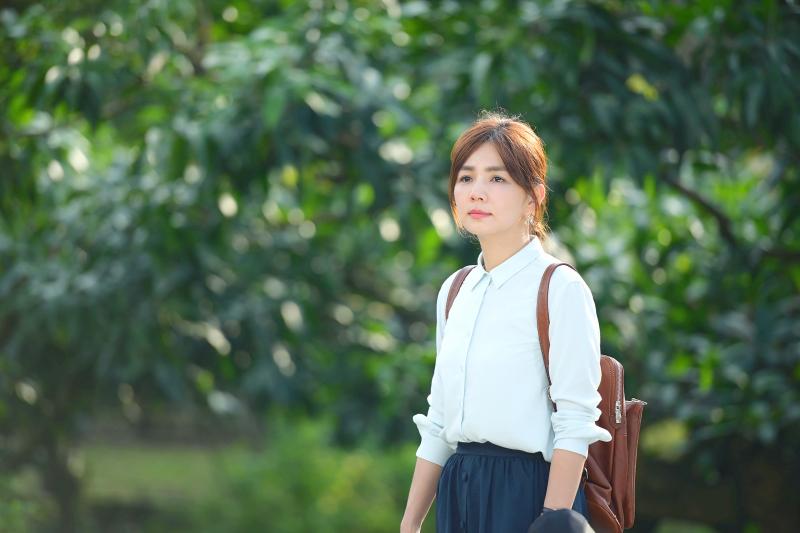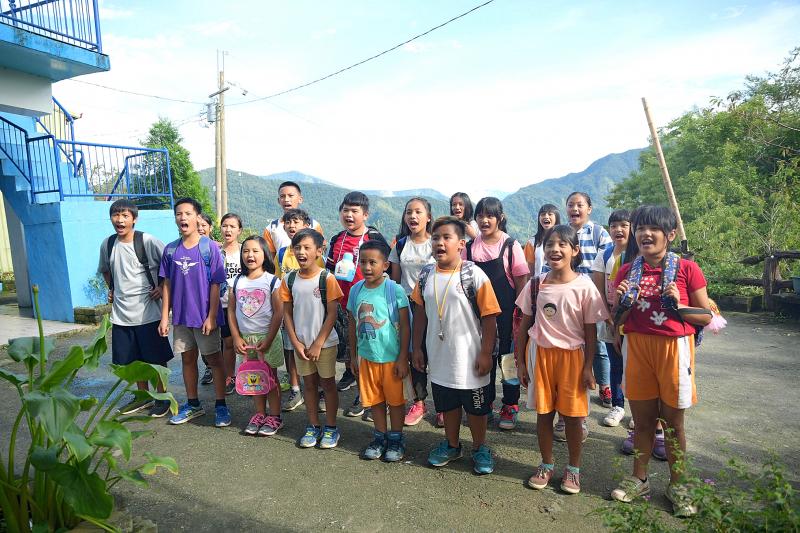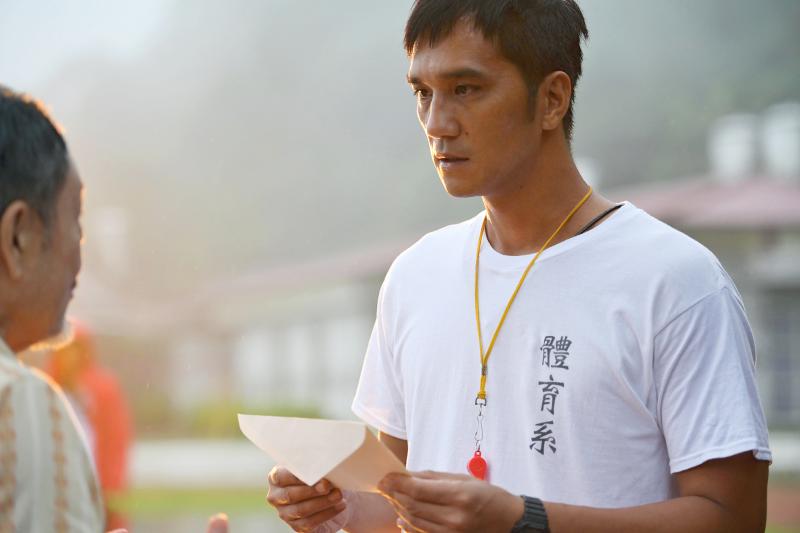Listen Before You Sing (聽見歌再唱) employs almost every device from the handbook of heartwarming and inspirational drama. While it works — as evidenced from the sniffles in the theater — it also results in a cliched and predictable production, albeit one that is hard to dislike.
It’s even more moving that the plot is based on the true story of Aboriginal Bunun educator Bukut Tasvaluan and his Vox Nativa choir, which went from a ragtag group to a highly acclaimed outfit showcasing Aboriginal culture and singing techniques while fostering pride and confidence in its members. They have won numerous awards, and their signature Let’s Clap Together was featured in the late Chi Po-lin’s (齊柏林) 2013 Golden Horse winning documentary Beyond Beauty: Taiwan from Above (看見台灣) and has since been performed across the world.
First-time feature director Yang Chih-lin (楊智麟) made a documentary on the subject in 2009, and spent the next decade trying to dramatize the tale (part of the struggle was getting Bukut’s approval). It is set in a modern day remote Bunun village, whose elementary school is in danger of closing due to rural flight and the nation’s plummeting birth rate. The school must demonstrate that it has “special characteristics” to stay open, and one might cringe and question where this film is going when a Han Taiwanese teacher suggests, “Aborigines are good at singing, why don’t we have them form a choir and participate in some national competitions?”

Photo courtesy of Warner Bros
The kids immediately defy the stereotypes and prove to be terrible, and Teacher Fang (Umin Boya, a fictional Bukut), who volunteered to lead the choir, is a sports teacher who cannot read music.
The issue of culture loss among the younger generation in these communities is a serious one, and Bukut is seen speaking to elders in Bunun and children only in Mandarin. It’s puzzling at first that the song they choose for their first competition is Mayday’s Mandarin ballad Contentment (知足), but this actually serves to heighten the contrast to their later journey of rediscovering their traditional ways and pride. This transition, however, is a bit abrupt and hard to believe — Aboriginal languages wouldn’t still be struggling to survive if you could get a group of children to start speaking them just like that — but ultimately the message is positive and encouraging, especially to young Aboriginal viewers.
It’s the same problem with the many other plot devices in the film Yang uses for dramatic effect and emotional impact. People don’t change overnight, but everyone seems to do so in this film as their conflicts are resolved instantly somewhere off screen. The dad (Bokeh Kosang) who has a grudge against Bukut and disapproves of the choir suddenly becomes their biggest supporter, and so on.

Photo courtesy of Warner Bros
With nobody actually knowing how to run a choir, it takes itinerant substitute music teacher Ms Huang (Ella Chen, 陳嘉樺) who knows nothing about Bunun culture, to swoop in and save the day. It isn’t clear whether this happened in the real story and Huang, who is unable to secure a full-time job, is also somewhat of an underdog, but this risks falling into the colonial trope of Han people bringing their “advanced” knowledge to “civilize” the Aborigines.
Fortunately, Huang differs from the other one-dimensional, responsibility-shirking Han teachers, who seem to have learned nothing about local culture during their time there. Her character should have been fleshed out more, but at least she doesn’t act like a savior and doesn’t end up as the hero. The whole process is actually quite collaborative with both teachers fully considering the students’ input, and that’s what Taiwan’s education should be like. However, Chen, who is better known as a singer, delivers a less than satisfactory performance.
The child actors, on the other hand, are wonderfully convincing and believable as actual members of the Vox Nativa choir. Their performances are nuanced and natural, and their brilliance alone is enough to make one overlook the other flaws in the film. The production, especially of their performance scenes, is superb, and their voices will linger in the audience’s mind long after the curtain falls.

Photo courtesy of Warner Bros
Despite its flaws, this film is just what it purports to be: a highly mass-appealing tale of inspiration and cultural awakening that brings attention to a Taiwanese success story that’s worth telling.

That US assistance was a model for Taiwan’s spectacular development success was early recognized by policymakers and analysts. In a report to the US Congress for the fiscal year 1962, former President John F. Kennedy noted Taiwan’s “rapid economic growth,” was “producing a substantial net gain in living.” Kennedy had a stake in Taiwan’s achievements and the US’ official development assistance (ODA) in general: In September 1961, his entreaty to make the 1960s a “decade of development,” and an accompanying proposal for dedicated legislation to this end, had been formalized by congressional passage of the Foreign Assistance Act. Two

March 31 to April 6 On May 13, 1950, National Taiwan University Hospital otolaryngologist Su You-peng (蘇友鵬) was summoned to the director’s office. He thought someone had complained about him practicing the violin at night, but when he entered the room, he knew something was terribly wrong. He saw several burly men who appeared to be government secret agents, and three other resident doctors: internist Hsu Chiang (許強), dermatologist Hu Pao-chen (胡寶珍) and ophthalmologist Hu Hsin-lin (胡鑫麟). They were handcuffed, herded onto two jeeps and taken to the Secrecy Bureau (保密局) for questioning. Su was still in his doctor’s robes at

Last week the Democratic Progressive Party (DPP) said that the budget cuts voted for by the China-aligned parties in the legislature, are intended to force the DPP to hike electricity rates. The public would then blame it for the rate hike. It’s fairly clear that the first part of that is correct. Slashing the budget of state-run Taiwan Power Co (Taipower, 台電) is a move intended to cause discontent with the DPP when electricity rates go up. Taipower’s debt, NT$422.9 billion (US$12.78 billion), is one of the numerous permanent crises created by the nation’s construction-industrial state and the developmentalist mentality it

Experts say that the devastating earthquake in Myanmar on Friday was likely the strongest to hit the country in decades, with disaster modeling suggesting thousands could be dead. Automatic assessments from the US Geological Survey (USGS) said the shallow 7.7-magnitude quake northwest of the central Myanmar city of Sagaing triggered a red alert for shaking-related fatalities and economic losses. “High casualties and extensive damage are probable and the disaster is likely widespread,” it said, locating the epicentre near the central Myanmar city of Mandalay, home to more than a million people. Myanmar’s ruling junta said on Saturday morning that the number killed had